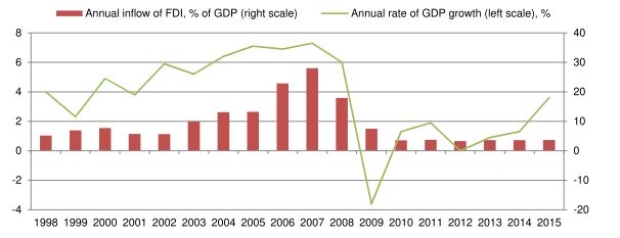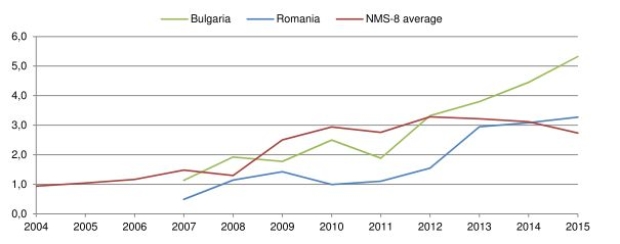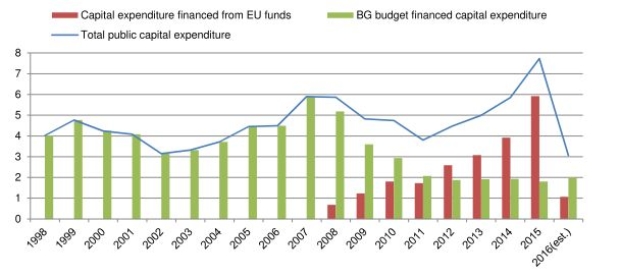Bulgaria in the EU: expectations and outcomes
11 July 2017
The realistic prospect of EU membership provided a powerful impetus to the economic and political transformation of the country. A commentary by Rumen Dobrinsky.
Photo credit: autumn falls, paul bica (CC BY 2.0)
The decade before accession: great expectations
For Bulgaria, which experienced a grave transition crisis in the 1990s, the decade leading to EU accession was a period of difficult transformation but also a time of great expectations of a new era of prosperity that was about to materialise with EU membership. The realistic prospect of EU membership was for Bulgaria – as for the other Central and East Europe countries – the single most important driver and catalyst of reforms, providing a powerful impetus to the economic and political transformation of these countries. The systemic reforms implemented within the decade from 1997 to 2006 were also applauded by investors and FDI flooded into Bulgaria in the first half of the 2000s (Figure 1).
Figure 1 / GDP growth and FDI inflows in Bulgaria, 1998–2015
FDI has been a key driver of economic restructuring and the modernisation of the Bulgarian economy ever since. While Bulgaria lost most of its inherited Soviet-type industry that did not manage to adjust to the new market environment, a process of gradual re-industrialisation and integration into EU and global value chains has been under way, driven by FDI. The ICT industry also saw a revival and the country became an attractive destination for the outsourcing of such services.
Joining the EU in times of crisis
However, Bulgaria’s first steps in the EU coincided with the global economic and financial crisis of 2008‑2009 and the prolonged stagnation in many parts of the world that followed. Being small and open, Bulgaria’s economy was highly susceptible to external shocks such as the sudden drop in external demand. But probably the most severe external shock was the drying up of capital inflows and their reversal after 2009 (Figure 1).
The irony in the case of Bulgaria is in the pure coincidence of the timing of the capital reversal with the country’s accession to the EU. In consequence, the first years of Bulgaria’s EU membership turned out to be a period of recession or near-stagnation and lack of visible catching up. Thus during the first decade as part of the EU, the Bulgarian economy was not delivering, or not delivering sufficiently, on one of the main expectations of the population associated with EU membership, that of increasing prosperity.
Uneasy start
Bulgaria’s cohabitation in the club with some of the old EU members has been somewhat awkward and uneasy. Some of the old members still preserve the reservations they had had towards Bulgaria’s accession to the Union as there was no unanimous EU view at the time whether the country had met all provision of the acquis communautaire. The most conspicuous sign of these reservations is the regular monitoring mechanism which is still being applied to Bulgaria and Romania to assess progress under the Cooperation and Verification Mechanism in the above areas.
However, the lingering hesitancy towards Bulgaria has been partly substantiated by the lack of visible progress in some key reform areas which had been part of the country’s EU accession deal. In the first place this concerns the judiciary system, which remains highly inefficient and is perceived as corrupt. On the other hand, the EU’s Cooperation and Verification Mechanism applied in the monitoring process has proved to be inefficient as an external anchor in that its critical conclusions have not been sufficient to instigate relevant response actions on the ground.
The downside of EU transfers
In retrospect, the main European focus of the efforts by Bulgaria’s political elite during the past decade has been on the fund allocations from the EU budget. These specific efforts have been generally fruitful, although success varied over time: after 2012 Bulgaria recorded one of the highest positive net financial positions among the EU members and in 2015 it actually reported the largest net balance (Figure 2).
Figure 2 / Net financial position1) of the new EU Member States, % of GNI, 2004–2015
While Bulgaria sought to be active in most EU programmes, the bulk of EU budget allocations to the country was apportioned to infrastructure development. The one genuine success story in this was the rapid extension of the metro in Sofia which was funded under different EU programmes. Highway construction as well as the upgrading of the railway network were also among the successful infrastructure projects.
At the same time, the successful absorption of EU funds in infrastructure development was also both a blessing and a curse for Bulgaria. In particular, over time, the preoccupation with ‘EU funds’ led to undesirable shifts, indeed distortions, in Bulgaria’s public investment policy and practice. While total public capital expenditure as a percentage of GDP generally increased after EU accession thanks to the allocations from the EU budget, the share of public capital expenditure financed from the general government budget declined rapidly (Figure 3).
Figure 3 / Public capital expenditure in Bulgaria, % of GDP, 1998–2016
Thus EU funding was de facto crowding out, rather than crowing in, local public investment funding. Bulgarian public investment programmes became skewed towards infrastructure development at the expense of other areas of needed public investment; furthermore, the abundance of EU funding gave rise to policy complacency.
EU membership without a vision
Bulgaria’s biggest problem with EU membership has been, and still is, the overall lack of strategy and vision regarding its own role in the Union. During the past decade Bulgaria not only never initiated any substantive issue or topic for an EU-wide debate but its own point of view has been practically missing in the debates initiated by other EU Member States at any level, from the top to the expert level. Thus Bulgaria voluntarily chose for itself the role of a passive observer and uninterested recipient of important decisions with an EU-wide outreach that do affect the country, its economy and society. This reflects a general absence of vision and strategy both in the domestic policy and political debates in recent years.
If it is to become a full-fledged, reliable and self-confident EU member contributing constructively and comprehensively to common EU objectives as part of its own strategic goals, Bulgaria still faces a challenging learning process.



